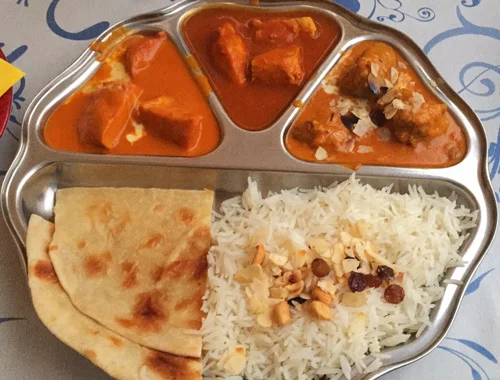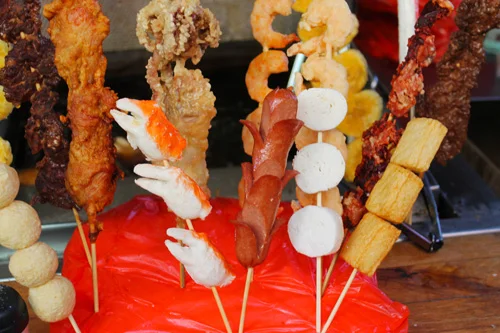How to Avoid a Delhi Belly
One of the main reasons that we travel, is food. It is one of life’s daily pleasures. Cuisine is a doorway to that allows us to step into a piece of culture that would have otherwise been closed to us.
My all time favourite Thali
When you are traveling on a shoestring budget in countries such as India, street food is a good way to coordinate your wallet with your desire to sample local delights. You can find a great variety of food vendors on every corner and with prices under $1, I dare you to resist. In most cases, these vendors specialize in cooking one particular food, which makes their dishes more often than not, irresistibly delicious. Unfortunately, Delhi Belly has been linked to unpleasant stomach experience rather than the explosion of flavours Indian food should give you. I know one of the first things you want to do after you get off the airplane is to intake the real flavours of India. And I don’t blame you. So many aromas, textures and flavours to try! But be careful.
In one way or another, most western travelers will unfortunately experience the diabolical Delhi Belly, especially those of us who intend to travel on a budget. In most cases, you can walk away with just a minor case of diarrhea or The Serpentine Syndrome as I like to call it; but there are occasional cases which are more severe and can make a trip supremely unpleasant. Some people assume that Delhi Belly is simply an unavoidable part of the experience. And up to a certain point, they might be right. But keep in mind, that the consequences of the dreaded Delhi Belly could mean that you’ll spend much of your valuable vacation time in bed missing out on important and awesome things. Occasionally people assume that they simply “cannot handle” the local cuisine, but more often the problem is that we aren’t taking enough care with our food. Even a local can get food poisoning (definitely not as often as a tourist but they do). The advantage they have is that they know where to buy their food.
I wouldn’t dream of suggesting you take street food off the menu, what I do suggest is being smart about the vendors you visit. Nobody can guarantee your gastronomical security, but here are some tips to get you thinking like a smart hungry traveler.
Play it safe the first days:
When you are traveling to countries with different climate than your own, it is important to give your body some time to adjust to the new environment. Heat can be overwhelming when it comes to temperatures, and food. Countries like India have a tropical climate and in hot countries, bacteria tend to grow faster. Also, there are certain types of curries which contain about 30 different spices and ingredients and I’m guessing that your body is not used to that. You can try family restaurants at first. Maybe leave street food out of the menu for a week or so. Letting your body adjust to the local hygienic standards.
Water:
Water is the most common carrier for stomach ache inducing bacteria. Especially in developing countries, water is not usually safe to drink. Be extremely careful when drinking. It is always preferable to drink bottled water, and use it even when you are brushing your teeth. Same goes for ice cubes. A friend of mine recently visited Egypt. He was really careful with the food and he was always buying bottled water. One day, as they took a day cruise on the Nile, he ordered a coke which came with ice cubes. That was it, he spent the next few days befriending the toilet. And the same goes for salads, fruits and anything that is washed. If you can’t peel it or cook it, my advice is to stay away from it.
With so many bizarre food around you, street food is irresistible...
Utensils and Hands:
This tip may be a bit exaggerated for destinations in the west, but when traveling in budget countries, chances are, your hands will be pretty dirty; carrying all sorts of bacteria from touching bus poles, tuk tuk seats, animals, and the most important, MONEY…. These countries are largely cash based and thousands of hands have touched those bills. I recommend keeping a small bottle of antibacterial gel handy. It is small, light weight and you won’t need to find a bathroom every time you need to wash your hands. The same goes caution should be applied to utensils. Just give them a quick clean with a cloth and the antibacterial gel.
Follow the locals: (This is and ever will be my golden rule)
Ok, this might seem logical but I needed to mention it. Always try to go to street food stands that are busy. Especially busy with locals and families with children. Nobody would take their children to a place with questionable cleanliness. Of course, sometimes, it might not be peak business hours and everything is quiet. In that case, try to choose the place which has the least variety on their menu. When a stand specializes only in a few dishes, they usually aren’t trying to pass off yesterdays warmed up leftovers as fresh.
And last but not least
Follow your senses:
Delicious Moroccan CousCous
Since we are used to highly sanitized and fresh food its usually pretty easy to spot when something seems a little off. Instinct can be your best friend. You see that this person handles the money and another person cuts fruits? It should be safer to eat there than a place where one guy is handling money and preparing food without washing his hands.
Even after following all these tips, there is also an element of luck to the eating game. Most people will at some point experience a bout of food poisoning whether it’s in the comfort of their own home, at a restaurant in their town, or in the colorful exotic streets of India. What’s important is recognising the signs of the illness and not panicking. Rest and staying near a toilet is the best cure. Remember to keep your fluids up as diarrhoea seriously depletes your body’s water supply.
Don’t be paranoid. Just be careful. Sometimes, street food can be much safer than you think.
Roo Tip: Always wash fruits and vegetables with bottled water.
Have you ever gotten the Delhi Belly? Any other tips you’d like to share? Let’s discuss this on the comments.



